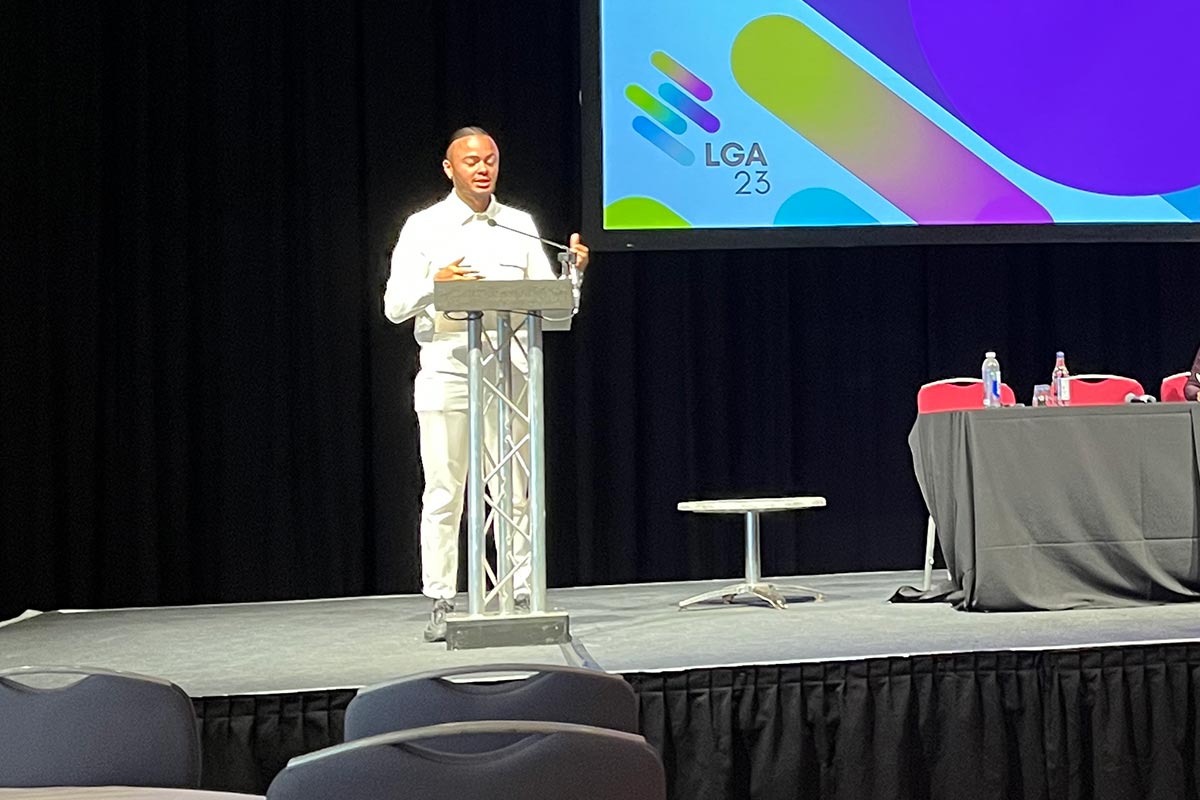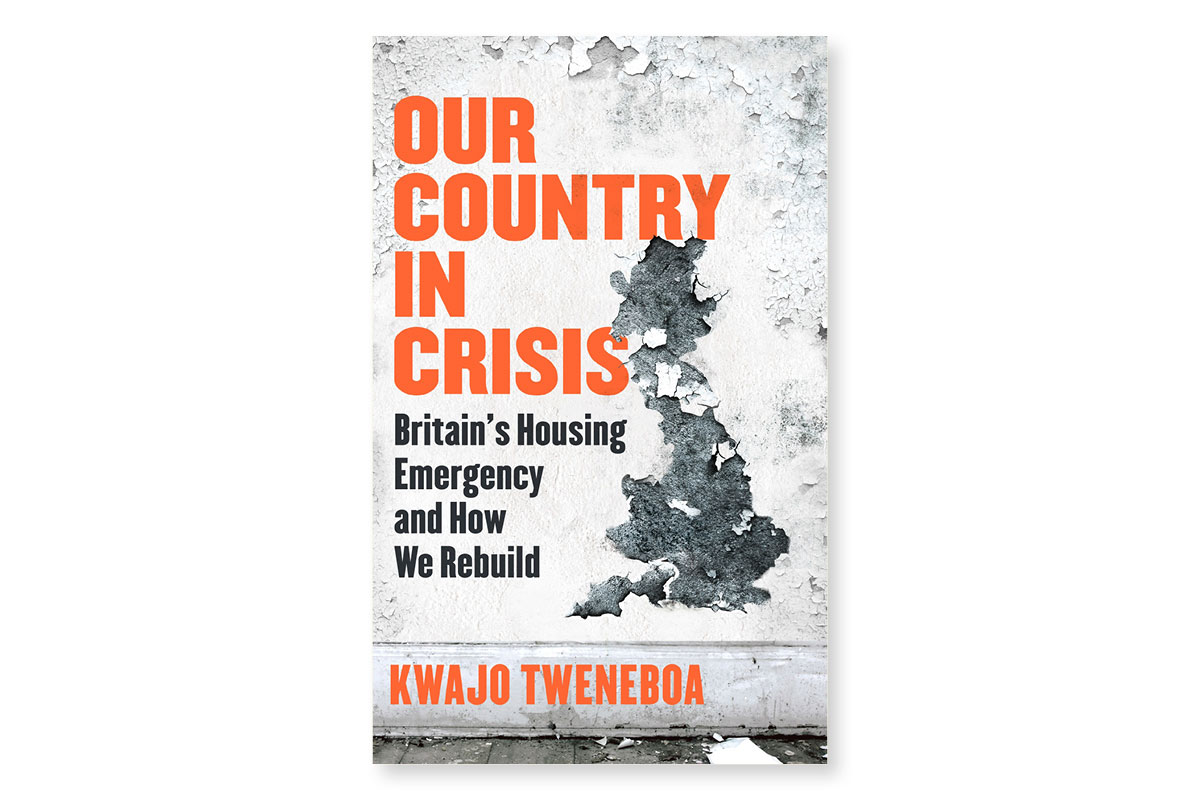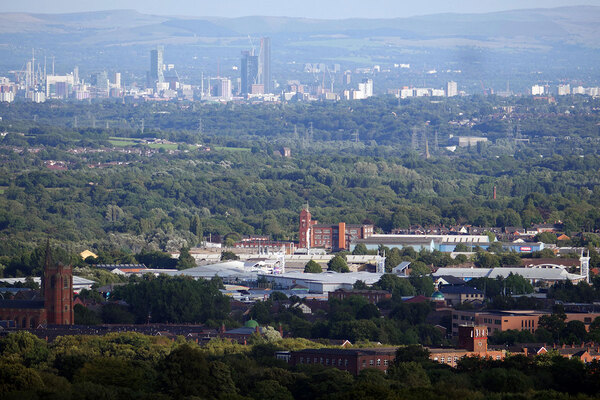Kwajo’s new book: how to fix Britain’s housing crisis
Kwajo Tweneboa is well known as a social media housing activist. With his first book, Our Country in Crisis: Britain’s Housing Emergency and How We Rebuild, out today, he talks to Jess McCabe
Kwajo Tweneboa’s new book is a call to action to fix social housing (and, while he is at it, fix the rest of the housing market).
Mr Tweneboa came to prominence after posting on social media about the dire conditions in his family’s flat on Clarion’s Eastfields Estate in south London. He became a superhero for social housing tenants – someone who could use his social media presence to bring pressure to bear, in cases when reporting a problem through official channels has not worked.
I first interviewed Mr Tweneboa in 2022, when he was just 23 years old. I began that interview by writing: “You probably already know the name Kwajo Tweneboa.” I was speaking to our housing sector readers, but he has since become an even more high-profile figure, frequently on television talking about the housing crisis.
And he has the ear of politicians – he took former housing secretary Michael Gove to visit residents and see the worst of the “slum” housing conditions in the sector first-hand. And he has met with new prime minister Sir Keir Starmer, and new housing secretary Angela Rayner.
“Loads of publishers reached out, all at the same time [asking], ‘Do you want to write a book?’ ‘Do you want to write a book?’” he recalls.
The result – Our Country in Crisis: Britain’s Housing Emergency and How We Rebuild – comes out today, 18 July. It is sure to draw lots of interest from Inside Housing readers, and beyond. So what does it have to say about social housing?
Three pillars
We meet in Starbucks a couple of weeks before the book’s publication day, and shortly before the general election. Mr Tweneboa is a few minutes late – a tenant recognised him walking through Victoria Station and wanted to talk about their problems. Throughout the interview, Mr Tweneboa’s two phones are buzzing.
He is wearing crisp white shorts and a T-shirt – something only worth mentioning because, in the book, Mr Tweneboa writes about the reactions he has had visiting parliament in a tracksuit.
Walking into Portcullis House for the first few times, he writes, he was looked at weirdly by security, which he puts down to his clothes and the colour of his skin. He goes on to point out that the politicians milling about could well share the background of people on an estate he has visited – but if there is diversity, it is invisible beneath the uniform of suits.
This is reminiscent of Keir Hardie, the first Labour MP to be elected to the Commons, who was lambasted for wearing workers’ clothes to parliament and not conforming to the etiquette of the day – when MPs wore frock coats and black top hats.
Just like Mr Hardie, Mr Tweneboa decided not to change to fit the setting – and he wants to shift the political balance so that it reflects the needs and interests of ordinary people. In the book, he writes of his determination not to change himself to fit the mould, or as he puts it, carve off parts of himself.
In person, Mr Tweneboa is serious and thoughtful. “I think I’ve got everything I wanted to say in there,” he says of the book. He makes the case that British society rests on three pillars: the NHS, education and housing.
“Far too many people don’t have access to a roof or a place that they can go, especially 145,000 homeless kids that we currently have,” he says. “So that’s the importance I was trying to drive home, not just for the ordinary person who reads it, but for politicians – in particular, those in charge of policy that are responsible for this mess that we find ourselves in. I want them to read that and understand that.”
The book, though, is not a polemic. It is a sensitive piece of work that weaves together research on the problems with housing in Britain today, with Mr Tweneboa’s own experiences and what he has learned from visiting many tenants in their homes and seeing just how bad conditions can be.
Mr Tweneboa’s activism came from seeing his father struggle with a terminal illness in appalling conditions in their Clarion flat. The book ends with an intensely personal and moving piece, ‘A Letter to My Dad’.
In the book, Mr Tweneboa takes us along to a resident’s flat, where she was struggling to get her landlord – L&Q – to address the serious cockroach infestation in her young children’s bedroom.
The issue was so bad that the provider’s gas engineers refused to come in and fix a leaky boiler. How is it possible, he asks, that a home could be considered unsafe for engineers – but fine for a mum with young kids to live in?
Even though the resident and her family were given a new property after Mr Tweneboa’s posts on social media gained attention, their story can tell us about the problems in the sector, and the price that is paid by tenants – particularly children.
Our Country in Crisis argues that the social housing sector has just not done a good enough job – indeed, that it is failing at maintaining homes to a liveable standard, and in treating residents respectfully.
“I’ve been very critical of this sector, of some of our leading bodies within social housing,” Mr Tweneboa says. “When I first started campaigning, they all turned around and said these are isolated incidents. Then
I had to drag my suitcase around the country, going into homes to prove actually [they’re not isolated incidents].”
He writes of his disappointment when he reported Clarion to the Regulator of Social Housing over problems on his own estate, and the body did not visit or talk to him or other residents before concluding that there was no systemic problem. He learned of this outcome only by reading a story in Inside Housing, not from the regulator.
Mr Tweneboa brought this up when he met with former housing secretary Mr Gove, he tells me. “I mentioned Ofsted, because I knew he was in charge of education when I worked at a school. Ofsted don’t just ring up the school head teacher and say, ‘Oh, how are you doing?’ ‘Yeah, we’re doing great,’ and it’s like, here’s an ‘Outstanding’. They don’t do that. They go in and they speak to kids, they speak to staff, and they do their own inspections from top to bottom. They scrutinise these institutions. And it should be the same within housing.”
Since Mr Tweneboa started campaigning, the last government introduced a new system of consumer regulation. It is still in the early days of implementation, but there is a significant change. Mr Tweneboa gives Mr Gove credit for getting the Social Housing (Regulation) Act through. “Was it as strong as I thought it should have been? It could have been stronger, but it always probably could be.”
On the former housing secretary’s legacy, he says: “Love him or hate him, I know that he saw what people were going through. It wasn’t televised or in the media, but I took him into some of the homes, and he voluntarily came and saw ceilings collapse, all sorts, people with disabilities living in slum housing.”
As well as lobbying politicians and highlighting individual tenant cases, Mr Tweneboa says he has spoken with Prince William’s team on the prince’s Homewards programme, which is aiming to cut homelessness in six flagship locations.
“I think any sort of light being shone in this area is great. And who better than the future king? It’s needed,” he says. “I really hope it is a complete success that can be rolled out around the country.”
Mr Tweneboa’s knowledge gained advocating for tenants is the reason people turn to him to talk about the worst of the country’s housing crisis. But becoming the voice of social housing tenants living in disrepair has taken its toll on the campaigner.
“Hearing people’s stories and the tragedies around that, and people dying from terrible illnesses and obviously my dad went through that, and people, young people being kicked out of their home, for example, after a parent passes away, and all of these sorts of issues. People just want someone to vent to. And sometimes it’s like…” Mr Tweneboa pauses. “I always take it, but sometimes it can become a lot on one person.”
Solutions
The book is not just about the housing crisis – it also seeks to provide some answers on how to solve it.
So what is Mr Tweneboa’s prescription? He is arguing for rent control in the private sector, to try to reduce the number of people who are finding themselves homeless. He is also calling for greater regulation of the private rented sector (PRS), registration of all landlords, and the end to Section 21 evictions. This last one should happen soon – the Renters Rights Bill, announced in the King’s Speech, is set to bring Section 21 evictions to an end.
The PRS is key to sorting out the housing emergency, Mr Tweneboa argues. “What happens when people can’t afford to privately rent? They turn to social housing. We have none of that to give them. They’re going to be joining the back of a queue of 1.4 million people.”
When it comes to the social housing sector, some of the solutions Mr Tweneboa puts forward are not going to be so popular with Inside Housing readers. He calls for the government to take away the job of building new homes from social landlords and give it to a new body, set up for development. This would, he argues, give social landlords the sole focus of providing a good service to tenants.
Many readers will disagree: housing associations argue that they have to manage homes for decades, so have the greatest interest in the construction sector in building high-quality homes. Indeed, providers are turning away from buying Section 106 homes built by private developers to meet planning conditions, citing poor quality.
Mr Tweneboa is not convinced. “That comes back down to regulation [of] the quality of these homes being built,” he says. Whether this convinces you or not, that it is being proposed at all is a clear sign of how much trust the sector has lost.
Mr Tweneboa also wants the new government to review and suspend the Right to Buy, and shift focus away from homeownership. Writing for Inside Housing before the election, Sir Keir talked up policies that support homeownership. Mr Tweneboa’s point? “That’s not where the resources should be focused.”
Sir Keir also described the Right to Buy as “a legitimate route for working-class aspiration” (although he did propose new limits to stop social housing being sold under the Right to Buy and swiftly turned into private rentals). Mr Tweneboa’s view of the Right to Buy is that “it’s like trying to fill a bucket up with holes in it”.
Yet, overall, he is hopeful that the new government can push for some change. Mr Tweneboa met Ms Rayner at the Housing 2023 conference. “I do think she gets it, and she’s from a social housing background, and I think it was probably one of the most positive conversations I’ve had with a politician,” he reflects.
What comes next is uncertain, he says. “Pressure has to be applied, yeah? Like we need to know, because you’ve asked for our votes, we’ve given you your votes now, and we need to know what exactly we can hold you to account on; what are you going to deliver for us? That’s why we voted you in.”
What are his plans next? “God knows,” he replies. Journalism is one possibility. More campaigning – perhaps on another issue – is another. Politics could be one option. He says: “I am very outspoken. That’s why I think I like doing what I’m doing now. I can say what I like, whereas in politics, you probably can’t.”
Recent longform articles by Jess McCabe
Inside Housing Repairs Tracker 2024
How much did English housing providers spend on repairs and maintenance in 2022-23? Jess McCabe looks through their financial records to find out
Who has built the most social rent in the past 10 years?
Jess McCabe delves into the archives of our Biggest Builders data to find out which housing associations have built the most social rent homes
Biggest Council House Builders 2024
For the second year running, Inside Housing names the 50 councils in Britain building the most homes. But is the rug about to be pulled on council development plans? Jess McCabe reports
Inside Housing Chief Executive Salary Survey 2024
Inside Housing’s annual survey reveals the salaries and other pay of the chief executives of more than 160 of the biggest housing associations in the UK, along with the current gender pay gap at the top of the sector. Jess McCabe reports
Sign up for our homelessness bulletin
Already have an account? Click here to manage your newsletters












